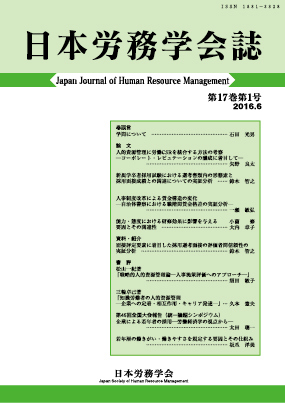
- Issue 2 Pages 2-
- Issue 1 Pages 2-
- |<
- <
- 1
- >
- >|
-
Takumi MIWA2010Volume 11Issue 2 Pages 2-16
Published: March 01, 2010
Released on J-STAGE: May 08, 2023
JOURNAL FREE ACCESSThe purpose of this paper is to examine the significance of career orientation in knowledge worker’s career self-reliance. In recently years, new concepts of career development such as Boundaryless career, Protean career, and Career self-reliance are discussed in the context of increasing of knowledge workers. And self-concept such as career orientation is recognized as the foundation of their career development. Based on survey researches in 359 Japanese knowledge workers, this paper clarifies their career orientations have positive effects to their learning, performances, and job satisfactions. The most important finding is that combined career orientations enrich knowledge worker’s learning and improve their performances and job satisfactions.
View full abstractDownload PDF (1222K) -
Jieping YU2010Volume 11Issue 2 Pages 17-29
Published: March 01, 2010
Released on J-STAGE: May 08, 2023
JOURNAL FREE ACCESSIn the past 20 years, Haier has made enormous development and become a worldwide brand from a nearly bankrupt company. How did it achieve its success? One of the reasons of why is the human resource management theory, i.e.“Horse races without horse experts”.
This paper focuses on Haier’s HRM theory, i.e.“Horse races without horse experts”. It is noted for open, fairness and impartial competition. According to this study, we find that the Haier’s theory is well-designed and reflects fully the character of fairness and competition; and it generates a virtual circle between fairness and competition by enabling employees to have the sense of accomplishment.
View full abstractDownload PDF (1261K) -
Tomotaka HIRAO, Osamu UMEZAKI, Hisakazu MATSUSHIGE2010Volume 11Issue 2 Pages 30-42
Published: March 01, 2010
Released on J-STAGE: May 08, 2023
JOURNAL FREE ACCESSIn this paper, we analyze the wage determinants and career paths of fresh graduates of a certain business school in Japan. Our study uses a data set drawn from a questionnaire survey conducted in December 2007.
Japanese graduate schools have experienced major reforms since the second half of the 1980s.Higher education reforms aiming at establishing graduate schools for professional education were promoted by the government. In response to these policy decisions, many higher education institutions have established master’s programs for professionals. Moreover, there is a growing acceptance of the view that higher education should not be confined to young students, but should even be provided to adult students; in keeping with this view, graduate schools in Japan have begun to recruit adult students as trainee professionals.
At the same time as the higher education reforms were being carried out, the condition of thelabor market kept on worsening with the economic recession since the early 1990s. Up to thistime, the long-term employment system based on the recruitment of fresh graduates and on-the-jobtraining had played an important role in the career formation of personnel in Japanese companies. However, the prolonged economic recession has led to the Japanese organizations to have little sense of responsibility for long-term personnel management. This reflected the limitation of the long-term personnel training system under the environment of the depression; it also indicated the rise to prominence of the aspect of career formation on the part of the employees. Japanese workers have now become aware of the need to decide the turning point in their careers by themselves.
Under the circumstance described above, employees and graduate schools have each come to have good reason to develop continuing professional training. Consequently, the number of adult students in graduate education has considerably increased. Although less than a thousand adult students were enrolled in the master’s courses in 1987, in 2007, this number increased to 8,470.
However, there is little literature on the relevance of graduate education to careers. This is little empirical research focusing on this issue. After receiving education and training, their effects are presumably appraised in consideration of occupational attainment. Therefore, we investigated the salaries and careers of workers after they passed out of business school. The subjects have all graduated with an MBA degree from the same business school. They were almost full-time workers before completing their degree, and after graduation, they were employed full time.
The survey included questions on the present income, pre- and post-MBA work experience, field of study, academic record, and present employment status, taking into account a number of control variables including demographic and economic variables.
A statistical analysis was conducted to examine the effect of adult graduate education. The results indicated that if the pre-MBA work experience corresponds to the field of study―for example, both the pre-MBA work experience and the field of study correspond to human resource management ―there is a high probability that the post-MBA work experience will also correspond to the field of study. In this case, there is a strong probability that the wages will increase.
Our conclusion is that MBA education leads to an increase in the salary of graduates when the work experiences correspond to the field of study. The results of this study indicate that the aim of adult graduate education to create better career opportunities by providing graduates with professional competencies is being met.
View full abstractDownload PDF (1214K)
- |<
- <
- 1
- >
- >|